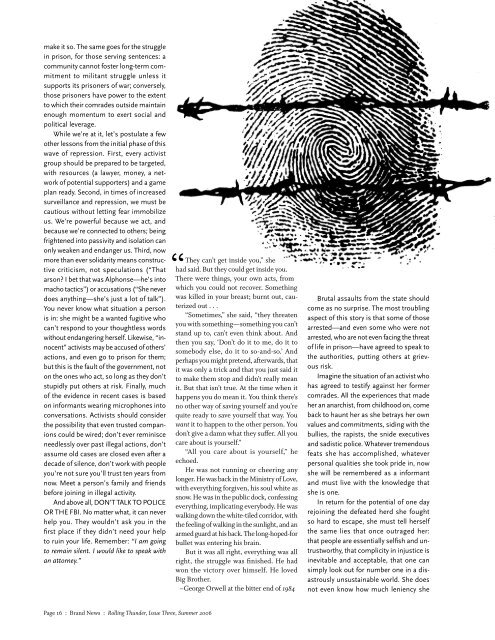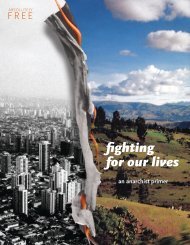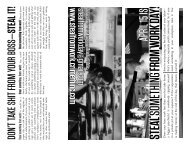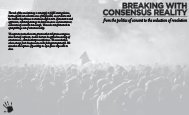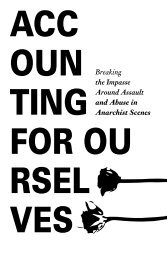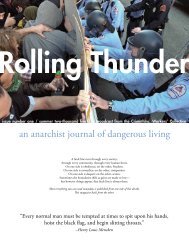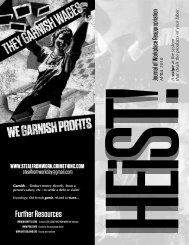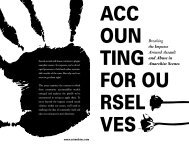Rolling Thunder - CrimethInc
Rolling Thunder - CrimethInc
Rolling Thunder - CrimethInc
You also want an ePaper? Increase the reach of your titles
YUMPU automatically turns print PDFs into web optimized ePapers that Google loves.
make it so. The same goes for the strugglein prison, for those serving sentences: acommunity cannot foster long-term commitmentto militant struggle unless itsupports its prisoners of war; conversely,those prisoners have power to the extentto which their comrades outside maintainenough momentum to exert social andpolitical leverage.While we’re at it, let’s postulate a fewother lessons from the initial phase of thiswave of repression. First, every activistgroup should be prepared to be targeted,with resources (a lawyer, money, a networkof potential supporters) and a gameplan ready. Second, in times of increasedsurveillance and repression, we must becautious without letting fear immobilizeus. We’re powerful because we act, andbecause we’re connected to others; beingfrightened into passivity and isolation canonly weaken and endanger us. Third, nowmore than ever solidarity means constructivecriticism, not speculations (“Thatarson? I bet that was Alphonse—he’s intomacho tactics”) or accusations (“She neverdoes anything—she’s just a lot of talk”).You never know what situation a personis in: she might be a wanted fugitive whocan’t respond to your thoughtless wordswithout endangering herself. Likewise, “innocent”activists may be accused of others’actions, and even go to prison for them;but this is the fault of the government, noton the ones who act, so long as they don’tstupidly put others at risk. Finally, muchof the evidence in recent cases is basedon informants wearing microphones intoconversations. Activists should considerthe possibility that even trusted companionscould be wired; don’t ever reminisceneedlessly over past illegal actions, don’tassume old cases are closed even after adecade of silence, don’t work with peopleyou’re not sure you’ll trust ten years fromnow. Meet a person’s family and friendsbefore joining in illegal activity.And above all, DON’T TALK TO POLICEOR THE FBI. No matter what, it can neverhelp you. They wouldn’t ask you in thefirst place if they didn’t need your helpto ruin your life. Remember: “I am goingto remain silent. I would like to speak withan attorney.”“They can’t get inside you,” shehad said. But they could get inside you.There were things, your own acts, fromwhich you could not recover. Somethingwas killed in your breast; burnt out, cauterizedout . . .“Sometimes,” she said, “they threatenyou with something—something you can’tstand up to, can’t even think about. Andthen you say, ‘Don’t do it to me, do it tosomebody else, do it to so-and-so.’ Andperhaps you might pretend, afterwards, thatit was only a trick and that you just said itto make them stop and didn’t really meanit. But that isn’t true. At the time when ithappens you do mean it. You think there’sno other way of saving yourself and you’requite ready to save yourself that way. Youwant it to happen to the other person. Youdon’t give a damn what they su≠er. All youcare about is yourself.”“All you care about is yourself,” heechoed.He was not running or cheering anylonger. He was back in the Ministry of Love,with everything forgiven, his soul white assnow. He was in the public dock, confessingeverything, implicating everybody. He waswalking down the white-tiled corridor, withthe feeling of walking in the sunlight, and anarmed guard at his back. The long-hoped-forbullet was entering his brain.But it was all right, everything was allright, the struggle was finished. He hadwon the victory over himself. He lovedBig Brother.–George Orwell at the bitter end of 1984Brutal assaults from the state shouldcome as no surprise. The most troublingaspect of this story is that some of thosearrested—and even some who were notarrested, who are not even facing the threatof life in prison—have agreed to speak tothe authorities, putting others at grievousrisk.Imagine the situation of an activist whohas agreed to testify against her formercomrades. All the experiences that madeher an anarchist, from childhood on, comeback to haunt her as she betrays her ownvalues and commitments, siding with thebullies, the rapists, the snide executivesand sadistic police. Whatever tremendousfeats she has accomplished, whateverpersonal qualities she took pride in, nowshe will be remembered as a informantand must live with the knowledge thatshe is one.In return for the potential of one dayrejoining the defeated herd she foughtso hard to escape, she must tell herselfthe same lies that once outraged her:that people are essentially selfish and untrustworthy,that complicity in injustice isinevitable and acceptable, that one cansimply look out for number one in a disastrouslyunsustainable world. She doesnot even know how much leniency shecan expect; the government can hardlylet her o¤ the hook when they’ve workedso hard to find her. On the other hand, asa snitch, she can be sure that if she goesto prison her fellow inmates will terrorizeher. This gives the state even more powerover her. Perhaps she considers breakingo¤ collaboration, but to do so would onlyleave her isolated from all directions; thedie is already cast. One can hardly imaginea worse position to be in.Let us phase out the masked figurelobbing a molotov cocktail as the idealizedimage of revolt; there is a time for that, andthe sooner it comes back around the better,but it is not the ultimate stage of struggle.Henceforth, when we think of resistanceat its most courageous and romantic, letus picture someone like ourselves in aninterrogation chamber, not masked buthandcu¤ed, being threatened with lifeand death in captivity and still refusingto render herself and her fellows into herenemies’ hands.Facing the threat of incarceration, wemust redefine freedom and safety as factorsunder our control, not external circumstances.Freedom is not a matter ofhow many fences happen to be aroundyou, but of following the dictates of yourconscience no matter what. Safety is notthe condition of being temporarily outsidethe grasp of your enemies, but of trustingyourself enough to know that your friendswill never come to harm because of youand you will never become somethingyou despise.We Can Win:Success Storiesfrom the Struggleagainst RepressionNot only is it critical to fight in thecourtrooms as well as the streets—it’s alsopossible to win those fights. A brief lookat our own recent history shows countlesscases in which activists have beatencharges and even come out ahead in counter-suits.Such victories not only discourageour enemies from taking us to court,they can also provide needed resourcesfor further organizing. Throwing up one’shands in panic as soon as someone getsarrested is not only counterproductive,it’s also needlessly pessimistic. To o¤setthe doomsaying of the inexperienced andeasily demoralized, let’s reflect on a couplerecent victories won by activists forced tofight within the legal system.At the Republican National Conventionin Philadelphia summer of 2000, CamiloViveiros and two others were beaten andarrested by a group of police that includedJohn Timoney, then Police Commissionerof Philadelphia. Charged with numerousfelonies (as a rule, you always get chargedby the police for whatever they do to you)and demonized as violent extremists, theactivists came to be known as the TimoneyThree; Camilo himself faced more thanthirty-seven years in prison and $55,000in fines. They awaited trial for four years,while Timoney jet-setted around the worldgiving presentations on how to repressprotesters and serving as Chief of Police inMiami during the FTAA ministerial in 2003.It seemed certain that anyone charged withassaulting someone in such a position ofpower was doomed to go to prison. Yetwhen the trial finally came, Timoney andthe other oªcers made fools of themselves,o¤ering wildly conflicting testimonies; afterthe defense presented a videotape thatrevealed the testimony of the police to bemere fabrication, the three were declaredinnocent of all charges. In an excellentarticle in the March-April 2006 issue ofthe Earth First! journal, Camilo outlinedthe lessons of that trial for those currentlyfacing government repression.One of the most important trials of thepreceding generation of environmentalactivism ended in an unconditional victoryover the mendacious, murderous authorities.In 1990, Judi Bari and Darryl Cherneywere nearly killed by a car bomb while ona speaking tour to promote resistance tocorporate logging. Rather than investigatingthe bombing, the FBI charged the twowith making and transporting bombs. Theyalso took advantage of the opportunity tocarry out a nationwide smear campaignagainst Earth First!, and sent agents tocreate dossiers on over five hundred activistsassociated with the organization.To this day, it remains unclear whetherthe bombing was the work of freelancevigilantes or of the FBI themselves—inthe weeks before it, FBI agents instructedthe local police on how to make bombsexactly like the one that nearly killed Judiand Darryl. The charges failed to hold upin court, and the two initiated a countersuitagainst the FBI and Oakland PoliceDepartment. Although the FBI managedto delay the trial for almost eleven years,during which Judi, who was crippled bythe bombing, died of cancer, Darryl andothers continued pressing the suit. Finally,in 2002, a jury found the FBI and OaklandPolice guilty and ordered them to pay $4.4million in damages.When the struggle in the courtroomfails, there are always other means ofresistance. On November 2, 1979, aftergiving birth in prison only to have herdaughter taken away in less than a week,Black freedom fighter Assata Shakur managedone of the most impressive jailbreaksof the era. After almost a year in a WestVirginia federal prison for women, surroundedby white supremacists from theAryan Sisterhood prison gang, Shakurwas transferred to the maximum securitywing of the Clinton Correctional Centerin New Jersey. There she was one of onlyeight maximum security prisoners heldin a small, well-fenced cellblock of theirown. The rest of Clinton, including itsvisiting area, was medium security andnot fenced in.According to news reports, Shakur’sescape proceeded as follows: Threemen—two black, one white—using bogusdriver’s licenses and Social Securitycards requested visits with Assata fourweeks in advance, as was prison policy.Apparently, prison oªcials never did therequisite background checks. On the dayof the escape, the three met in the waitingroom at the prison entrance, where theywere processed through registration andshuttled in a van to the visiting room inSouth Hall. One member of the team wentahead of the others. Although there wasa sign stating that all visitors would besearched with a hand-held metal detector,he made it through registration withouteven a pat-down. Meanwhile, the othertwo men were processed without a search.As these two were being let through thechain-link fences and locked metal doorsat the visiting center one of them drew agun and took the guard hostage. Simultaneously,the man visiting Shakur rushedthe control booth, put two pistols to theglass wall, and ordered the oªcer to openthe room’s metal door. She obliged.From there, Shakur and her companionstook a third guard hostage and madePage 16 : Brand News : <strong>Rolling</strong> <strong>Thunder</strong>, Issue Three, Summer 2006<strong>Rolling</strong> <strong>Thunder</strong>, Issue Three, Summer 2006 : Brand News : Page 17


